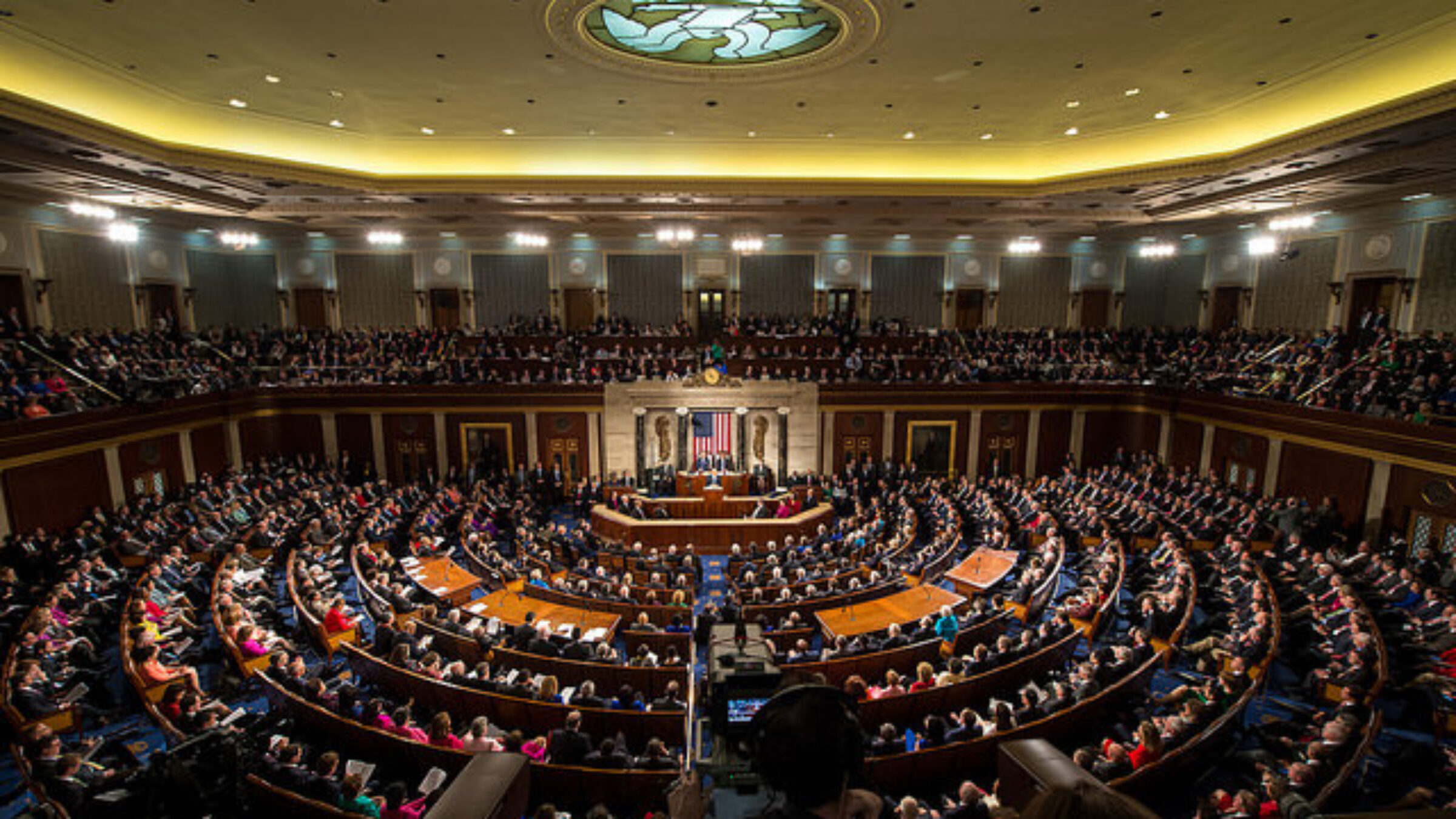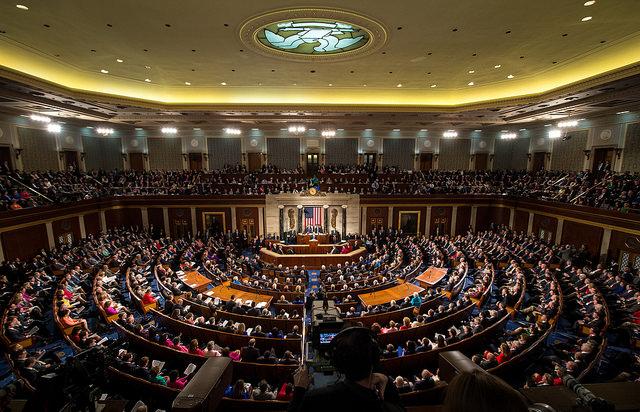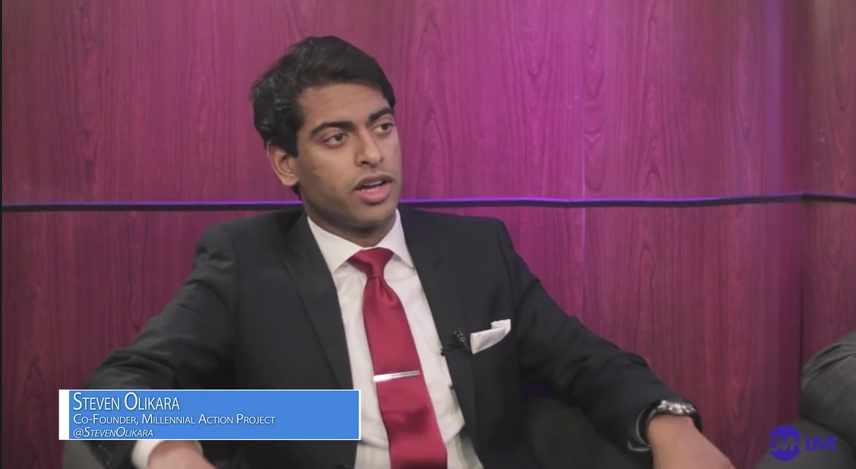5 Things Millennials Were Thinking During #SOTU
January 23, 2015
After President Obama delivered his second-to-last State of the Union speech, we asked current undergraduate students spanning the political spectrum for their reactions on the issues Millennials care about.

Editor’s Note: The Millennial Voices series is written by and for Millennials to foster nonpartisan discussion. Karlee Ursta is a junior at American University. The opinions expressed in this commentary are solely those of the author.
The 2015 State of the Union (SOTU) address had everyone talking, specifically the generation of Americans known as “Millennials.”
Video courtesy of Global Voice Hall Live
Immediately following the speech, MAP’s President Steven Olikara discussed the policy issues mentioned by President Barack Obama and what they mean for Millennials with Global Voice Hall at their State of the Union watch party.
According to the Pew Research Center, Millennials are the most educated generation of Americans to date, with roughly eighty percent of us having completed a four-year degree or being currently enrolled in an undergraduate program. Millennials are also the most financially burdened Americans, due in part to the student loans that accompany higher education.
Young Americans in this age group believe that real change can’t come from the traditional government institution, but instead from social entrepreneurship. With this in mind, we reached out to more than a dozen students enrolled at American University in Washington, DC to gauge the reactions of Millennial conservatives, liberals, and independents to President Obama’s State of the Union address.
1. Free community college education: #Winning or #WTH?
President Obama spoke about lowering community college costs to nothing, much like American public high schools.
“As a college student, I couldn’t agree more that higher education is vital. But, his promise of ‘free community college’ is hardly that. Instead, it’s paid for via higher taxes, including cap-gains taxes, and inheritance taxes. That affects people like my parents, who have already paid two full college tuitions. Paying for free community college also is coming directly out of savings accounts established by middle-class families to send their kids to college. Under his plan, 529 college savings accounts will be now be fully taxed upon withdrawal. That’s not free – it’s taking money directly from families who have worked their whole lives to save for their kids’ education.”
“I had been looking forward to hearing the President’s proposal on college affordability since he first announced it in Tennessee earlier this month. Putting it in a personal lens — he told the story of a woman whose family finances had been hurt by student loan debt from attending community college — helped the proposal hit home. Millennials know all too well the necessity of a college education and the costs that come with it. Many have said that completing at least some college is as important as obtaining a high school diploma. If that’s the case, then the President is right. Two years of college should be as free as K-12 education. We’re all helped when more of us have better, higher-paying jobs, which makes this an outstanding opportunity.”
“I think that Obama embarrasses the US with his free two-years of college plan when we consider that our European counterparts subsidize up to four years of university. Look at Germany, for example, who just made college universal. Considering that most jobs outside of the service and technical industry involve four year college degrees, Obama is basically telling people that they’re doomed to be mediocre at best. In my opinion all public schools should provide free education. [At the very least,] any person with student loans from a public university should be put through forgiveness programs that at least cover two years worth of their tuition after the two year college motion has passed.”
2. Social dynamics of race and gender: What’s black, white, and trending all over?
The president barely touched on possibly the biggest social cleavage of our time: The fiery events in Ferguson, Missouri that sparked an inferno across the nation. He did, however, speak about LGBTQ equality, becoming the first president to openly broach the topic in a SOTU address.
“The State of the Union Address was powerful, touching, and reassuring of many values I share with my fellow Americans. That being said, I think our President missed an opportunity to elucidate an issue that must be addressed in order for the United States to live up to our emblem of justice and equality. With the recent occurrences of police brutality, I think the first black president could have taken a stronger stance for communities of color. Though he did allude to the events in Ferguson, I think the larger issue of racial injustice and cultural sensitivity could have been better incorporated alongside the other critical issues that face our nation.”
“I was really excited that Obama did not only talk about equality and protection for the races, but also mentioned bisexuals and transgender people as it was the first time it has been mentioned on a national scale and I think it will set the stage for equality in the future for transgender people.”
3. Climate change: 99 problems and all of them are carbon emissions.
President Obama thinks that the most threatening foreign policy issue facing our generation is climate change.
“President Obama did particularly well in pushing the fact that effective legislation to curb climate change is needed now, especially in acknowledging that while he might not be a scientist, almost every well-respected scientist in the world agrees that climate change is occurring. So many of the people in my generation, both conservatives and liberals, are starting to see that climate change is possibly the most important issue our country, and the rest of the world, is dealing with right now, and I was so proud that President Obama decided to use his speech to highlight that fact.”
“Out of everything President Obama mentioned in the SOTU, climate change is probably the most important issue for me…I think it is essential for our generation to recognize that the time to act is NOW – there is no need to “wait until we’re older” or “gain more experience” before taking action on issues we care about. We are informed, well-educated and perfectly capable of mobilizing on behalf of a cause we care about. Climate change is the issue that will define our generation, and we can’t afford to wait.”
4. The economy: No more wolves on Wall Street?
President Obama touched on the fact that our economy is in recovery from the last recession and is on the verge of a potent new era of strength.
“As a college student preparing for graduation, I am disappointed to hear that President Obama plans to continue the same outdated, Washington-centered, and top-down economic policies that have divided our country under his presidency…President Obama has the opportunity to work with House and Senate Republicans to implement policies that will allow the private sector to rebuild the American economy, instead of big-government centralized planning that has proven to be ineffective. We can do this with new, open, and bottom-up economic policies that encourage economic growth naturally and organically. ”
“It’s fascinating to see national republicans like Sen. McConnell taking credit for the booming economy only three weeks into the new year. We’ve seen nearly uninterrupted job growth since the President took office, and I’m really hoping that he can work with the new Republican majority to keep that record.”
“After having lived through the recession for so long, it really is hard to grasp that our economy is functioning as well as the President says. I am also very hopeful of the education ambitions he announced, however I’m worried our new Congress will act very little during his last two years, [because of the partisan gridlock].”
5. Free and open Internet: Our generation’s “final frontier?”
The president vowed to protect free and open internet for every community in America.
“If there’s one thing that the recent, disastrous rollout of Obamacare has shown Millennials, it’s that bureaucrats in Washington are not capable of overseeing the most important facets of America’s economy. Yet, in his State of the Union address on Tuesday night, the President restated and repeated his desire to subject broadband internet providers to an even greater degree of oversight by federal agencies and stifling regulations. Unfortunately, this was just the most recent in a long line of stances, which highlight the fact that this administration simply does not understand how to grow jobs. President Obama’s outdated, top-down approach is not what’s best for the new, incredibly fast and elegantly diverse, modern world that we live in. At a time when both college costs and youth unemployment are so high, it doesn’t take much sense to realize that policies, which threaten the future of our thriving internet economy, are not in the best interests of Millennials.”
“The White House unveiled most of the President’s internet policy before the speech, so didn’t come as much of a surprise to me. Most Democrats and a growing number of Republicans are in support of net neutrality, and I’m glad it’s getting the attention it deserves. It’ll be interesting to see how the President’s push for more and better functioning public networks will work out. Perhaps it could be included in any infrastructure legislation (in any is passed) that comes out of the 114th Congress.”
“From streaming services like Netflix to online gaming to shopping on Amazon, and everything else in between; all of that DEPENDS on a free and equal internet to work the way they do now. Take net neutrality away, and you open the door to data discrimination, mafia-like shakedowns of smaller companies by larger ones, and a general stagnation of the once thriving resource of innovation…In the long run, it’s likely that Obama will be remembered, at least in part, as the President who defended the internet should his efforts succeed. At this point in time, I’m cautiously optimistic that he will which is not something I thought I would say 6 months ago.”
In conclusion, we Millennials have one overarching goal that crosses party lines: The restructuring of American politics. To Millennials, “compromise” is not a situation wherein no one gets what they want; instead, Millennials understand that discussion and true post-partisanship, despite differing ideologies, is how we effectuate change.
Millennials are here, they are bold, and they are ready to create a new America.
Karlee Ursta is a MAP Operations Intern and is attending American University where she she majors in International Studies and minors in Biology. She recently spent four months living in Ireland and traveling through Europe. Her career goal is to one day blend her two favorite subjects, science and politics, into something she can make a living off of.
As a tax-exempt nonprofit organization governed by Section 501(c)(3) of the Internal Revenue Code, Millennial Action Project (MAP) is generally prohibited from attempting to influence legislative bodies in regards to policy and legislation. It is important to note guest authors frequently take firm stances on issues and policy matters that are currently being debated by policymakers; when they do, however, they speak for themselves and not for MAP, its board, council or employees.







